Around 200 residents gathered for a Nov. 28 meeting at the Nepean Sportsplex, many of whom came to voice their angry opposition to proposed newcomer reception centres in the area.
During an open floor session, one resident stood up and declared: “Nobody wants freeloading Third-World Africans in their neighbourhood,” a remark that met with applause from some attendees. After he sat down, another attendee approached him, saying, “Thank you for pointing out the pink elephant in the room.”
The meeting was organized to discuss the city’s proposal to build newcomer reception centres.
The City of Ottawa has announced plans to build two reception centres for migrants, asylum seekers, and refugee claimants to address the growing demand for shelter services. However, while some residents criticize the chosen locations, newcomers question whether these centres truly meet their needs.
The primary centre will be located at 1645 Woodroffe Ave. on the Nepean Sportsplex property, with a secondary site proposed at 40 Hearst Way in Kanata pending federal funding.
The centres are intended to address Ottawa’s surging demand for emergency housing and provide a dignified and supportive environment for newcomers with essential on-site services to help the transition to permanent housing.
However, residents of Nepean, where the first centre is to be built, worry that it could disrupt their neighbourhood.
The centre would provide temporary lodging for up to 90 days, offering settlement support, housing assistance and employment training. They will also connect newcomers to health resources, language training and transitional housing.
But the rollout of the plan has not been smooth. While Ottawa has a history of welcoming refugees — from the 1970s Project 4000 that resettled Vietnamese boat people to recent efforts supporting Syrians and Ukrainians — some residents feel the current influx is overwhelming existing systems. Many residents in Nepean and Kanata say they feel blindsided by a lack of consultation, even as city officials argue the sites were carefully selected based on accessibility and feasibility.
Residents said one of the key issues was the lack of transparency in the selection process.
Bhavik Patel, who started a petition against the project, says residents are frustrated by the city’s lack of communication.
“I’m not against asylum seekers, but I am against the system for not being transparent,” Patel said. The petition has gathered more than 10,000 signatures, reflecting widespread unease among residents.
Patel clarified that his opposition is not to asylum seekers themselves, but to the process by which the decision was made.
“For the past three years, every person has been going through different challenges. Why not address those first before putting the asylum seekers?” he said.
Mike Patton, one of the organizers of the meeting, questioned the practicality of the proposed locations.
“There’s nothing around here — no stores, no work opportunities, no services. They’re stuck on an island.”
City officials argue the centres are urgently needed. Over the past two years, Ottawa has seen a sharp rise in asylum seekers, who now make up 60 per cent of emergency shelter users. Some of the city’s recreation facilities, currently used as temporary overflow shelters, are at capacity.
Rev. Joseph Kiirya has been running Stepstone House to provide transitional shelter for refugees for the past five years and has already witnessed the positive contributions of many newcomers.
He called out politicians who, in his view, have stoked fears.
“On this particular issue, we had some people in positions of political power provided very erroneous information to the community,” Kiirya said.

“I don’t blame the community’s reaction, because the community was fed with wrong information.”
Kiirya is no stranger to the challenges newcomers face. Right now, Stepstone House accommodates 120 refugees. He says asylum seekers are often mischaracterized.
“They are not dangerous people. They come to do our health-care work, to do our cleaning, to do our cooking. They boost the economy,” he said.
But before newcomers can integrate into the Canadian economy, they often face challenges rebuilding their lives.
For Mileda Jaweb, who fled Afghanistan three years ago, adjusting to life in Ottawa has been challenging. The services provided by welcoming centres were crucial.
Jaweb works part-time in sales but is seeking a full-time position in economics, her field of study. She said the immigration process was especially challenging for her because, when leaving Afghanistan, there was no functioning state authority able to issue official documents such as passports.
She said when she first landed in Ottawa, she was placed in a crowded shelter with little privacy and had no idea where to turn for help.
“A place to stay should be more than just a bed — it should be somewhere you can find peace. Everything felt overwhelming — especially understanding the system and finding my way around the city,” she said.
Jaweb is hopeful about the newcomer reception centres planned by the City of Ottawa and emphasizes the importance of considering newcomer needs in the additional supports provided beyond housing.
“I wished there had been more structured guidance for newcomers, like a step-by-step plan or dedicated case workers. It would have made the transition smoother,” she said.
“Having cultural orientation sessions will also help newcomers better understand Canadian customs.”
Pending funding, the centres are expected to open by the end of 2025. The initiative reflects Ottawa’s commitment to welcoming newcomers and supporting their successful integration into the community.

Newcomers without asylum seeker, refugee or PR status face more difficulties in integrating into society.
Gamze Karaman, who survived the February 2023 earthquake in Turkey, said the language barrier is one of the biggest challenges she faces.
She moved to Ottawa this past August with a three-year work permit provided by the Canadian government. However, as she does not have refugee status, she has been unable to access any newcomer support services.
“Finding reliable information about basic services like health care or transportation is really difficult. Cultural differences also take time to understand. Connecting newcomers with mentors who have been through the process would be very helpful,” Karaman said.
“In the meantime, I feel isolated. I wished for more mental-health support — moving here was very stressful.”
Karaman believes the newcomer reception centre might be a safe space where newcomers can receive personalized support.
“A reception centre could offer structure and support during those first critical months. If all the essential services are under one roof, it would save a lot of time and confusion,” she said.
Karaman moved to Ottawa with her husband and their two young children. Despite being a qualified doctor, her husband struggled to find work and was unable to secure full-time employment.
Faced with mounting challenges, he made the difficult decision to return to his home country, where he now lives in a container village built for earthquake survivors. From there, he transfers most of his income to Gamze, helping to support his family as they try to build a new life in Canada.
“We came to Ottawa after losing our home in the earthquake, but now my husband is no longer here with me. I hope future newcomers don’t have to struggle as much as I did,” she said.
“I will endure this for my children’s education.”





Wow this is rich. I am wondering if the person who said this and the other who applauded are all racist against Africans, and by Africans do they mean black people. I personally am not for this refuge asylum seekers nor against it. The government will do as it pleases no matter opposing views. The government is looking at the future money that is to be made with the influx of newcomers. Money talks, bullshit walks.
What I cannot stand is the classifying of Africans as freeloaders and the racist outburst from the people at that meeting. Do the mean black people?
Nobody wants freeloading Third-World Africans in their neighbourhood,” a remark that met with applause from some attendees.